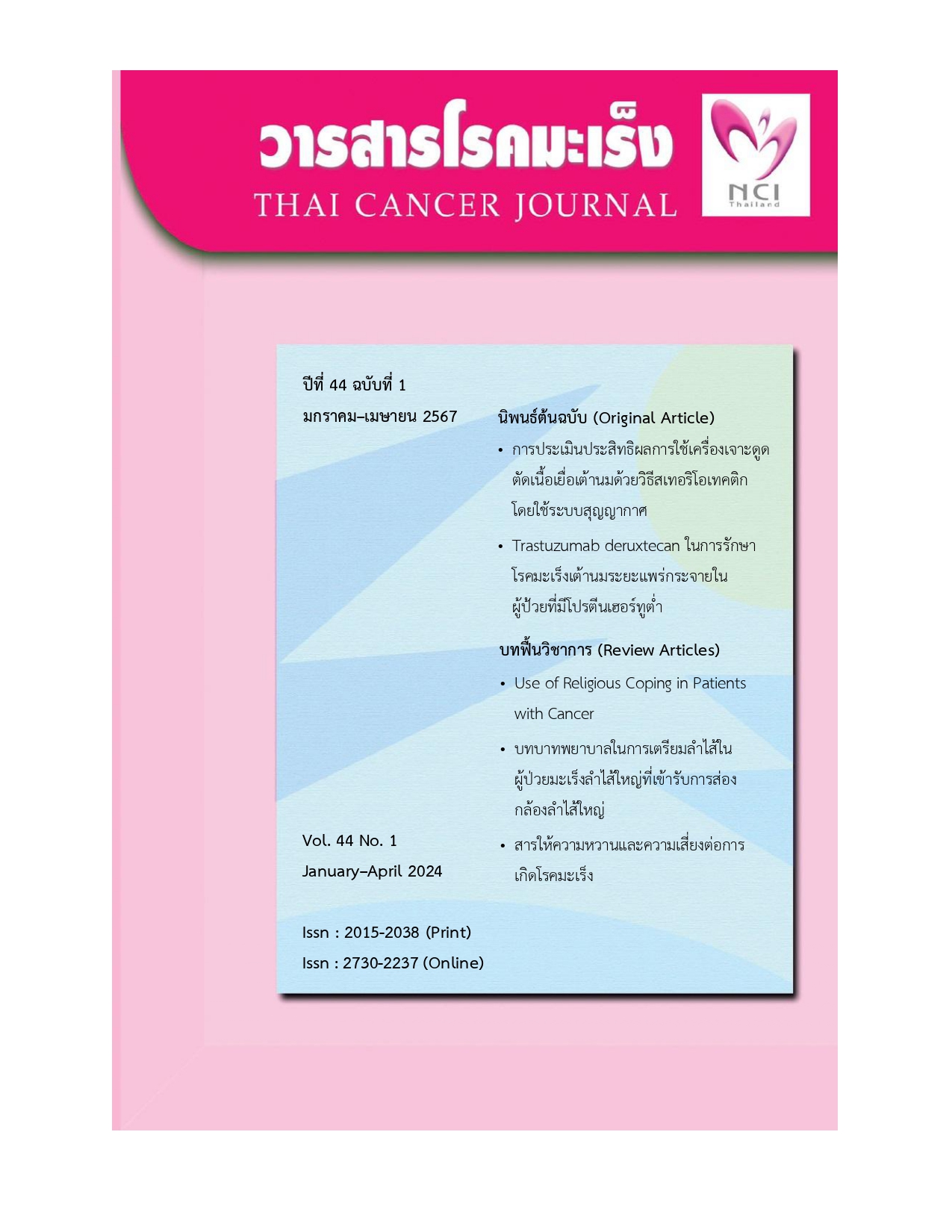สารให้ความหวานและความเสี่ยงต่อการเกิดโรคมะเร็ง
คำสำคัญ:
แอสพาร์เทม, สารให้ความหวาน, สารให้ความหวานแทนน้ำตาลที่มีพลังงานต่ำหรือไม่มีพลังงาน, ปริมาณได้รับสัมผัสบทคัดย่อ
แอสพาร์เทมเป็นสารให้ความหวานชนิดไม่ให้พลังงานหรือพลังงานต่ำ มีความหวาน 150-200 เท่าของน้ำตาลซูโครส สามารถถูกย่อยสลายได้สารแอสพาร์ติกแอซิด (aspartic acid) ฟีนิลอะลานีน (phenylalanine) และเมทธานอล (methanol) มักใช้เป็นสารให้ความหวานในส่วนผสมของเครื่องดื่มชนิดไม่มีแอลกอฮอล์ เช่น เครื่องดื่มชา กาแฟ ชนิดชงพร้อมดื่มและโกโก้ผสม และมักใช้ในอาหารของผู้มีปัญหาสุขภาพ เช่น ผู้ป่วยเบาหวาน โรคอ้วน หรือผู้ต้องการควบคุมน้ำหนัก โดยจะควบคุมพลังงานที่ได้รับและไม่มีผลต่อระดับน้ำตาลในเลือด แต่ไม่ควรใช้ในปริมาณเกินค่าปริมาณสารที่สามารถบริโภคได้โดยไม่ก่อให้เกิดอันตรายตามที่กำหนด ซึ่งคณะกรรมการผู้เชี่ยวชาญด้านวัตถุเจือปนในอาหารขององค์การอาหารและเกษตร the Food and Agriculture Organization (FAO) Joint Expert Committee on Food Additives (JECFA)) องค์การอนามัยโลก แห่งสหประชาชาติ (World Health Organization (WHO) และข้อกำหนดตามประกาศกระทรวงสาธารณสุข ฉบับที่ 389 พ.ศ. 2561 เรื่องวัตถุเจือปนอาหาร (ฉบับที่ 5) อย่างไรก็ตาม ในปี พ.ศ. 2566 องค์การอนามัยโลกจัดให้แอสพาร์เทมเป็นสารที่อาจจะก่อมะเร็งในมนุษย์ในกลุ่ม 2B (IARC group 2B) จากการสืบค้นข้อมูลที่เกี่ยวกับแอสพาร์เทมและความเสี่ยงต่อการเกิดโรคมะเร็ง พบว่าการบริโภคแอสพาร์เทม ส่งผลให้การเพิ่มขึ้นของน้ำหนักและมวลไขมันเพิ่มขึ้นและยังเพิ่มความเสี่ยงต่อการเกิดมะเร็งหลายชนิด เช่น มะเร็งเม็ดเลือดและน้ำเหลือง มะเร็งเต้านม มะเร็งต่อมลูกหมากและมะเร็งที่เกี่ยวข้องกับความอ้วน หากรับประทานในปริมาณสูงเป็นประจำ เป็นต้น นอกจากนี้ยังพบว่า ปริมาณแอสพาร์เทม เพิ่มอุบัติการณ์การเกิดมะเร็งเม็ดเลือดขาวและมะเร็งต่อมน้ำเหลืองในสัตว์ฟันแทะ รวมทั้งยังทำให้เกิดการเปลี่ยนแปลงสารพันธุกรรมก่อมะเร็ง ส่งผลให้เพิ่มความเสี่ยงต่อการเกิดมะเร็งเต้านมและมะเร็งต่อมลูกหมากสูงขึ้นด้วย อย่างไรก็ตามข้อมูลดังกล่าวเป็นการศึกษาเบื้องต้นจึงควรมีการศึกษาเพิ่มขึ้นจนกว่าจะได้ข้อมูลที่ชัดเจน รวมทั้งการศึกษาในกลุ่มประชากรต่อไป (วารสารโรคมะเร็ง 2567;44:21-30)
เอกสารอ้างอิง
สำนักข่าวสร้างสุข สำนักงานกองทุนสนับสนุนการสร้างเสริมสุขภาพ. รณรงค์ลดหวาน ลดโรค สั่งหวานน้อยไม่เกิน 2 ช้อนชา ปรับพฤติกรรมใหม่ ลดเสี่ยงป่วยโรค NCDs [อินเทอร์เน็ต]. [เข้าถึงเมื่อ 25 มี.ค.2567]. เข้าถึงได้จาก: https://www.thaihealth.or.th/?p=314094.
The Nation. The Public Health Ministry is targeting sweet drinks in its latest campaign to curb Thais’ health-damaging addiction to sugar [Internet]. [cited 2023 Dec 7]. Available from:https://www.nationthailand.com/lifestyle/30403903.
World Health Organization. WHO calls on countries to reduce sugars intake among adults and children [Internet]. [cited 2023 Dec 7]. Available from: https://www.who.int/news-room/detail/04-03-2015-who-calls-on-countries-to-reduce-sugars-intake-among-adults-and children
ปิยะพันธ์ พฤกษพานิช. เครื่องดื่มหวาน ๆ อร่อยแต่อันตราย เป็นภัยต่อสุขภาพ [อินเทอร์เน็ต]. [เข้าถึงเมื่อ 7 ธ.ค. 2566]. เข้าถึงได้จาก: https://chulalongkornhospital.go.th/kcmh/line.
กองสุขศึกษา กรมสนับสนุนบริการสุขภาพ กระทรวงสาธารณสุข. กินน้ำตาลมากเกินไป...เป็นภัยต่อสุขภาพ [อินเทอร์เน็ต]. [เข้าถึงเมื่อ 7 ธ.ค. 2566]. เข้าถึงได้จาก: https://www.prd.go.th/th/content/ category/detail/id/31/iid/206377.
Schorb S, Gleiss K, Wedekind R, Suonio E, Kull AK, Khuntz M, et al. Assessment of aspartame (E951) occurrence in selected foods and beverages on the German Market 2000-2022. Foods 2023;12:21-56.
World Health Organization (WHO). Aspartame hazard and risk assessment results released [Internet]. [cited 2024 Mar 21]. Available from: https://www.who.int/news/item/14-07-2023-aspartame-hazard-and-risk-assessment-results-released.
Harvard TH. Chan school of Public Health. Low-calorie sweeteners [Internet]. [cited 2024 Mar 21]. Available from:https://www.hsph.harvard.edu/nutritionsource/healthy-drinks artificial-sweeteners/.
FDA: U.S. Food and Drug Administration. High-Intensity Sweeteners [Internet]. [cited 2024 Mar 21]. Available from: https://www.fda.gov/food/food-additives-petitions/high-intensity-sweeteners.
สำนักโภชนาการ กรมอนามัย. สารให้ความหวานทดแทนน้ำตาล [อินเทอร์เน็ต]. [เข้าถึงเมื่อ 7 ธ.ค.2566]. เข้าถึงได้จาก: https://nutrition2.anamai.moph.go.th/webupload/6x22caac0452648c8dd1f 534819ba2f16c/m_document/31949/14470/file_download/0f0233d34bfff924f62bca83e4de0c03.pdf
Calorie control council. Low calorie sweetener: aspartame [Internet]. [cited 2023 Aug 21]. Available from: https://www.caloriecontrol.org/ aspartame. html.
European Commission-Scientific committee on food. Scientific facts on aspartame [Internet]. [cited 2023 Aug 21]. Available from: http://www.greenfacts.org/en/aspartame/l-3/aspartame-1.html.
วรรณคล เชื้อมงคล. สารให้ความหวาน: การใช้และความปลอดภัย. วารสารวิทยาศาสตร์สุขภาพแห่งประเทศไทย. 2551;3:161-8.
Maler V, Goetz V, Tardieu M, Khalil AE, Alili JM, Meunier P, et al. Aspartame and phenylketonuria: An analysis of the daily phenylalanine intake of aspartame containing drugs marketed in France. Orphanet J Rare Dis 2023:18;14
พิมพ์เพ็ญ พรเฉลิมพงศ์, นิธิยา รัตนาปนนท์. Aspartame/แอสพาร์แทม. Food Network Solution ศูนย์เครือข่ายข้อมูลอาหาร [อินเทอร์เน็ต]. [เข้าถึงเมื่อ 7 ธ.ค. 2566]. Available from: https://www.foodnetworksolution.com/wiki/word/1209/aspartame
National Institute of Standards and Technology (NIST) Aspartame [Internet]. [cited 2023 Mar 21]. Available from: https://webbook.nist.gov/cgi/inchi/InChI%3D1S/C14H18N2O5/c1-21-14%2820%2911%287-9-5-3-2-4-69%291613%2819%2910%2815%29812%2817%2918/h26%2C1011H%2C78%2C15H2%2C1H3%2C%28H%2C16%2C19%29%28H%2C17%2C18%29.
Magnuson BA, Burdock GA, Doull J, Kroes RM, Marsh GM, Pariza MW, et al. A safety evaluation based on current use levels, regulations, and toxicological and epidemiological studies. Crit Rev toxicol 2007;37:629-727.
Oppermann JA, Muldoon E, Ranney RE. Metabolism of aspartame in monkeys. J Nutr 1973;103:1454-9.
Ranney RE, Oppermann JA. A review of the metabolism of the aspartyl moiety of aspartame in experimental animals and man. J Environ Pathol Toxicol 1979;2:979-85.
Reid AE, Chauhan BF, Rabbani R, Lys J, Copstein L, Mann A, et al. Early exposure to nonnutritive sweeteners and long-term metabolic health: A systematic review. Pediatrics 2016;137:e20153603. doi: 10.1542/peds.2015-3603.
Archibald AJ, Dolinsky VW, Azad MB. Early-life exposure to non-nutritive sweeteners and the developmental origins of childhood obesity: Global evidence from human and rodent studies. Nutrients 2018;10:194. doi: 10.3390/nu10020194.
Chen YC, Yeh YC, Lin YF, Au HK, Hsia SM, Chen YH, et al. Aspartame consumption, mitochondrial disorder-induced impaired ovarian function, and infertility risk. Int J Mol Sci 2022;23:12740. doi: 10.3390/ijms232112740.
ปรัญรัชต์ ธนวิยุทธ์ภัคดี, ชนิพรรณ บุตรยี่, วันเพ็ญ วิมลพีรพัฒนา, พัชรี มั่นคง, ทรงศักดิ์ ศรีอนุชา. การประเมินความเสี่ยงของการได้รับสัมผัสเอสพาร์เทม อะซีซัลเฟม-เค และซูคราโลส จากอาหารและเครื่องดื่มในประชากรไทย. วารสารพิษวิทยาไทย 2564;36:113-30.
International Agency of Research on Cancer (IARC). Aspartame hazard and risk assessment results released [Internet]. [cited 2023 Aug 22]. Available from: https://www.iarc.who.int/ news-events/aspartame-hazard-and-risk-assessment-results-released/.
World Health Organization (WHO). Aspartame hazard and risk assessment results released [Internet]. [cited 2023 Aug 22]. Available from: https://www.who.int/news/item/14-07-2023-aspartame-hazard-and-risk-assessment-results-released.
Landrigan PJ, Straif K. Aspartame and cancer-new evidence for causation. Environ health 2021;20-42.
Soffritti M, Belpoggi F, Tibaldi E, Degli Esposti D, Lauriola M. Life-span exposure to low doses of aspartame beginning during prenatal life increases cancer effects in rats. Environ health perspect. 2007;115:1293-7.
Finamor IA, Bressan CA, Torres-Cuevas I, Rius-Pérez S, Veiga Md, Rocha MI, Pavanato MA, et al. Long-term aspartame administration leads to fibrosis, inflammasome activation, and gluconeogenesis impairment in the liver of mice. Biology (Basel) 2021;10:82.
Debras C, Chazelas E, Srour B, Druesne-Pecollo N, Esseddik Y, Edelenyi FSd. Artificial sweeteners and cancer risk: Results from the NutriNet-Sant population-based cohort study. PLoS Med 2022;19:e1003950. doi: 10.1371/journal.pmed.1003950.
เครือไทยโฮลดิ้งส์. 6 โรคที่คนไทยเสียชีวิตมากที่สุด [อินเทอร์เน็ต]. [เข้าถึงเมื่อ 7 ธ.ค. 2566]. เข้าถึงได้จาก: https://www.southeastlife.co.th/blog/detail/top-6-casualties-diseases-thailand.
ดาวน์โหลด
เผยแพร่แล้ว
ฉบับ
ประเภทบทความ
สัญญาอนุญาต

อนุญาตภายใต้เงื่อนไข Creative Commons Attribution-NonCommercial-NoDerivatives 4.0 International License.
บทความทีตีพิมพ์ในวารสารโรคมะเร็งนี้ถือว่าเป็นลิขสิทธิ์ของมูลนิธิสถาบันมะเร็งแห่งชาติ และผลงานวิชาการหรือวิจัยของคณะผู้เขียน ไม่ใช่ความคิดเห็นของบรรณาธิการหรือผู้จัดทํา







